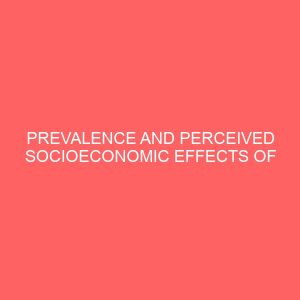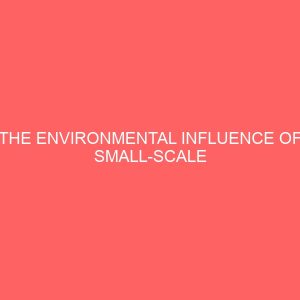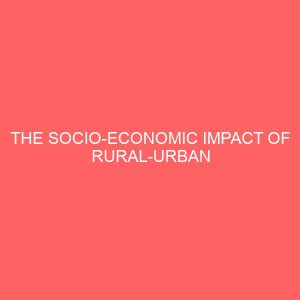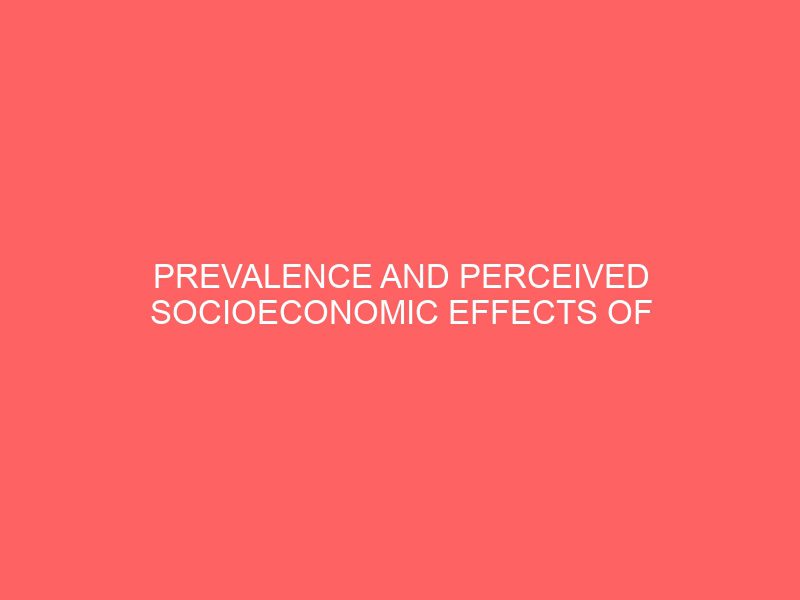Description
ABSTRACT
Despite the control programme mounted by African Programme on Onchocerciasis Control APOC in collaboration with Ebonyi State Government, the disease still persists. The main purpose of the study was to examine the prevalence and perceived socioeconomic effects of Onchocerciasis disease in Ebonyi State. In order to achieve this purpose, ten specific objectives and corresponding research questions were posed to guide the study. Seven hypotheses were also formulated to provide further guide for the study. The survey research design was used to carry out the study. The multistage sampling procedure was applied using structured questionnaire to elicit information from respondents aged 10 years and above. The results obtained showed an overall prevalence rate of 19.3. That is out of every 100 persons 19 had one or more of the signs and symptoms of Onchocerciasis disease. Nodules 36.2 was the commonest sign and symptom of Onchocerciasis disease. The study also revealed that Onchocerciasis disease increases with age. Those aged 50 to 59 had the highest score of 43.6. Females 64.7 contrary to most previous studies had more cases of the disease than the males 35.3. Respondents who attained only primary level of education 53.4 or nonformal education 20.9 were prone to having Onchocerciasis disease. The occupation groups mostly affected by Onchocerciasis disease in Ebonyi State were hunters 35.2, traders 27.0 and fishermen 17.8. The results indicated that Onchocerciasis disease had negative socioeconomic effects like feeling shy in public x 3.69, ashamed in public places x 3.81, affected self esteem x 3.53, feeling of pity x 3.61, people avoiding sufferers x 3.46, giving up jobs x 3.29, low income x 2.81, loss of man hour x 3.78 and economic loss as a result of buying protective clothing x 3.27. Visual impairment and blindness as a result of Onchocerciasis disease were found from the study to affect productivity, the sufferers were found to be less useful to themselves and those blind due to Onchocerciasis disease needed a guide to ensure their movement. Onchocerciasis disease was discovered from the study to affect marriage prospects of victims just as 73.5 and 82.1 will not like to marry a person that is visually impaired or blind respectively due to Onchocerciasis disease. The study revealed that age, gender, level of education and occupation exerted a significant influence on the distribution pattern of Onchocerciasis disease. They also exerted significant influence on the socioeconomic effects as well as problems associated with visual impairment/blindness in Ebonyi State. It was recommended, among others, that health education should be intensified and targeted at encouraging preventive measures against the transmission of Onchocerciasis disease in Ebonyi State.
TABLE OF CONTENTS
TITLE PAGE i
APPROVAL PAGE ii
CERTIFICATION iii
DEDICATION iv
ACKNOWLEDGEMENTS v
ABSTRACT vi
TABLE OF CONTENTS vii
LIST OF TABLES xi
CHAPTER ONE: INTRODUCTION 1
Background to the Study 1
Statement of the Problem 7
Purpose of the Study 8
Significance of the Study 9
Scope of the Study 11
Research Questions 11
Hypotheses 12
CHAPTER TWO: REVIEW OF RELATED LITERATURE 14
Conceptual Framework 14
Concept of Onchocerciasis 15
Prevalence of Onchocerciasis Disease 18
SocioEconomic Effects of Onchocerciasis Disease 22
Other Effects of Onchocerciasis Disease 25
Historical Perspective, Discovery and Complications of Onchocerciasis Disease 27
Onchocerciasis Disease: The Parasite and its Severity 32
Age and Onchocerciasis Disease 33
Gender and Onchocerciasis Disease 34
Level of Education and Onchocerciasis Disease 35
Occupation and Onchocerciasis Disease 36
Area of Residence and Onchocerciasis Disease 36
Marriage Prospects, Skin Appearance and Onchocerciasis Disease 37
Farmland Close to the River and Onchocerciasis Disease 38
Control Programmes put in place for Onchocerciasis Disease in the World 40
Theoretical Framework 44
Theories of Disease Causation/the Early and Sacred Theories of Disease 44
The Germ Theory of Disease 47
The MultiCasual Models of Disease/Epidemiological Theory of Disease/ Web Causation of Disease 49
The Theory of General Susceptibility 50
Psychosocial Theory 51
Social Production Theory 52
Empirical Studies on Prevalence and Socioeconomic Effects
of Onchocerciasis Disease 55
Summary of Literature Review 69
CHAPTER THREE: METHOD 72
Research Design 72
Area of the Study 73
Population of the Study 74
Sample and Sampling Techniques 75
Instrument for Data Collection 76
Validation of the Instrument 78
Reliability of the Instrument 79
Method of Data Collection 79
Method of Data Analysis 80
CHAPTER FOUR: PRESENTATION AND ANALYSIS OF DATA 82
Summary of Major Findings 112
CHAPTER FIVE: DISCUSSION OF RESULTS, CONCLUSIONS
AND RECOMMENDATIONS 114
Discussion of Results 114
Prevalence of Onchocerciasis Disease 114
Prevalence of Onchocerciasis Disease in Relation to Age 115
Prevalence of Onchocerciasis Disease in Relation Gender 116
Prevalence of Onchocerciasis Disease in Relation Level of Education 117
Prevalence of Onchocerciasis Disease in Relation to Occupation 117
Perceived Socioeconomic Effects 118
Problems Associated with Visual Impairment 120
Conclusions 121
Implications of the Study 123
Recommendations 124
Limitations of the Study 125
Suggestions for Further Research 125
REFERENCES 126
APPENDICES 141
A. Questionnaire 141
B. Organogram of Ebonyi State Onchocerciasis Control Programme 151
C. Distribution of People above 10 Years 152
D. Yaro Yamen Formula for Determining Sample Size 153
E. Reliability 154
LIST OF TABLES
Table 1: Prevalence Level of Onchocerciasis 82
Table 2: Number of People in Different Age Groups Affected by Onchocerciasis Disease in Ebonyi State 84
Table 3: Number of Males and Females Affected by Onchocerciasis Disease 85
Table 4: Number of People in Different Levels of Education Affected by Onchocerciasis Disease 86
Table 5: Number of People in Different Occupation Groups Affected by Onchocerciasis Disease 87
Table 6: Perceived Social Effects of Onchocerciasis Disease 88
Table 7: Perceived Economic Effects of Onchocerciasis Disease 89
Table 8: Problems Associated with Visual Impairment 90
Table 9: Onchocerciasis and Marriage Prospects in Ebonyi State 91
Table 10: Willingness to Pay for Drugs Should Donor Withdraw in Future 92
Table 11: General 93
Table 12: Summary of Chisquare Analysis Testing the Hypothesis of No Significant Difference in the Prevalence of Onchocerciasis according to Age 94
Table 13: Summary of Chisquare Analysis Testing the Hypothesis of No Significant Difference in the Prevalence of Onchocerciasis according to Gender 95
Table 14: Summary of Chisquare Analysis Testing the Hypothesis of No Significant Difference in the Prevalence of Onchocerciasis according to Level of Education 96
Table 15: Summary of Chisquare Analysis Testing the Hypothesis of No Significant Difference in the Prevalence of Onchocerciasis according to Occupation 97








Reviews
There are no reviews yet.